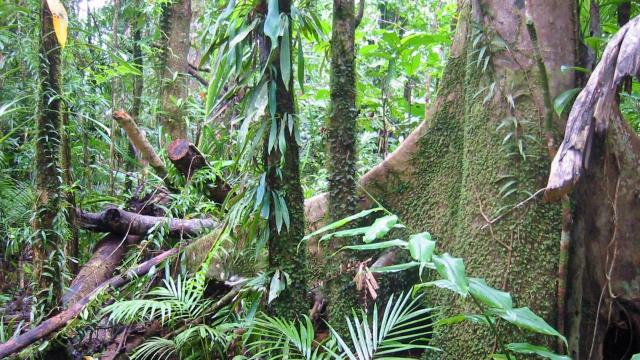Australia can’t seem to catch a break. The Great Barrier reef is still limping along after hottest summer on record. Now, authorities are warning that the endless heat has placed a world-class rainforest in grave danger.
A statement issued Monday by the management authority for the Wet Tropics of Queensland World Heritage Area warns that site, which spans 450 kilometers along Australia’s Northeast coast, is experiencing “accelerating decline” as a result of human-caused climate change, and that several species found nowhere else on Earth are on the verge of disappearing forever.
“The Board of the Wet Tropics Management Authority (the Board) has now become aware that, following the hottest summer ever recorded, some of the key species for which the Wet Tropics World Heritage Area was listed are at imminent risk of extinction,” the statement reads.
The Queensland world heritage area is a patchwork of tropical rainforests, steep gorges, ocean vistas and waterfalls known for its “superlative scenic features” and “magnificent sweeping landscapes” according to UNESCO. It’s considered the world’s oldest rainforest; a relic of the Gondwana forest that spanned parts of Australia and Antarctica some 50 million years ago, it contains what UNESCO describes as one of the “most complete and diverse” records of the evolution of land plants. It’s a haven for marsupials, birds, and hundreds of other rare species found nowhere else.
Now, much of this irreplaceable diversity faces an existential threat in the form of rising temperatures. Scientists have known this for years: A 2016 report called climate change “the most significant future threat to the region” noting it was driving cool-adapted mountain species out of the lower part of their range and causing populations to decline.
A 2017 report by the International Union for the Conservation of Nature rated the world heritage site an area of “significant concern,” calling out climate change as well as invasive species as two major threats.
The new statement by the site’s management board ratchets up the alarm even higher, describing extreme heat that has afflicted the region of late as its “coral bleaching event equivalent,” an allusion to the heat wave that recently cooked and killed half of the corals in the Great Barrier Reef.
The board points out that while one imperiled species, the white lemuroid ringtail possum, can’t last “even a day” at temperatures above 29 degrees Celsius, the highest mountain peak in the region experienced “unprecedented” 39 degree Celsius heat spikes this past summer. Other similarly threatened species include the green ringtail possum and the tooth-billed bowerbird, both found nowhere else. The latest evidence suggests extinctions for species like these may come “even sooner” than previously expected, according to the board.
“This is occurring now, not in the future, and requires an immediate response,” the board wrote in the statement.
As far as that response goes, the management board outlines a 10-point plan of interventions, including restoring wildlife corridors, expanding monitoring effects, and “[i]mmediate and aggressive control” of pests like feral pigs.
The plan also calls for strengthening partnerships with the rainforest’s Aboriginal peoples, and finalising the Wet Tropics Climate Adaptation Plan “as a matter of urgency.” A draft of that plan is slated to be released in June.
Finally, the statement calls for “urgent action on reducing global emissions.” A companion news release highlights the global nature of the crisis facing tropical forests. Historically, the impacts of climate change have been understudied in the tropics, but recent evidence suggests those impacts are likely to be significant.
With stable temperatures year-round, rainforest species are often adapted to a narrow temperature range, and emerging evidence suggests they don’t always handle change well.
“It can be assumed that tropical forests and ecosystems around the world are similarly impacted or worse,” the news release reads.
In response to the board’s dire warning, the Australian Conservation Foundation issued its own call to action on Tuesday that did not mince words (and, frankly, threw a little shade).
“This is a clear and urgent call for action from the normally dour public servants and scientists who look after one of Australia’s most precious places,” Australian Conservation Foundation CEO, Kelly O’Shanassy said in the statement.
“Ultimately we are witnessing the destruction by climate change of one of the most ecologically important and beautiful places in the world that we as Australians have promised to look after on behalf of all humankind.”
